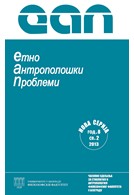O očuvanju nacionalnog identiteta i kulturne baštine u evropskim integracijama: Osnovne zablude i značajnije mogućnosti
On Maintaining National Identity and Cultural Heritage within European Integrations: Basic Misconceptions and Important Possibilities
Author(s): Miloš MilenkovićSubject(s): Law, Constitution, Jurisprudence, Museology & Heritage Studies, Government/Political systems, Cultural Anthropology / Ethnology, EU-Approach / EU-Accession / EU-Development, Politics and Identity, Identity of Collectives
Published by: Филозофски факултет, Универзитет у Београду
Keywords: Republic of Serbia; European Union; European integrations; protection of cultural heritage; maintaining national identity; applied ethnology; applied anthropology; anthropology of the state and law;
Summary/Abstract: Leaning on contemporary transcendence of the national/democratic dichotomy in Serbian public sphere and the recent turn from governmental to cultural elites in the incentive policies of the EU and the European Council directed at the Republic of Serbia, the paper recommends a new field of application of ethnology and anthropology, based on previous analyses and modifications of identity policies of the EU. The foundation of the baseless idea of Europe as a framework in which national identities and cultural heritage are weakened or even disappear is considered, and the fact that the EU is the largest global consumer of identity is pointed out, along with the possibilities this brings to the domain of maintaining the national identity and cultural heritage of the citizens of Serbia. Ethnologists and anthropologists can participate in this process not only professionally, as researchers, or privately as political actors, but also in the domain of the application of science, helping culturally legitimate elites recognize that the "protection" of national identities and cultural heritage within the confines of an international budget is a lucrative, sustainable and efficient way to maintain interpretative sovereignty, especially in times of crisis for national budgets. As ethnologists and anthropologists are professionally trained in for consultancy within the domain of identity issues, they are in the unique position to point both sides in the process of European integrations toward the huge potential of further redirecting of incentives toward culturally legitimate elites.
Journal: Етноантрополошки проблеми
- Issue Year: 8/2013
- Issue No: 2
- Page Range: 453-470
- Page Count: 18
- Language: Serbian

